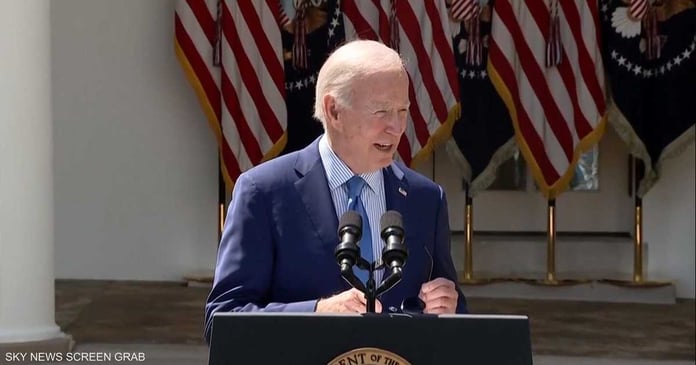While raising the debt ceiling is essentially a routine process, it has become a point of contention in recent years with Republican lawmakers seeking spending cuts in return for raising the ceiling.
President Joe Biden, a Democrat, insists Congress has a constitutional duty to raise the debt ceiling unconditionally to pay for previously approved spending. While Republicans, who control the House of Representatives, want Biden to agree to deep budget cuts to gain their approval.
Unlike most developed countries, the United States caps the amount it can borrow. Legislators must raise this ceiling periodically, as the government spends more money than it earns.
What is Section 14?
Article 14, which was added to the US Constitution in 1868 after the Civil War, states that “the validity of the public debt of the United States authorized by law (..) shall not be questioned”, which means that expenses approved by vote must be respected, including pensions.
Clarifying the article, Robert Hackett, a law professor at Cornell University, said that after the Civil War, “fear grew (in the victorious Northern states) that Southern lawmakers returning to Congress would continue to destroy our federal unity from within by repudiating the federal government”. debt created by the war”, according to a report by Agence France-Presse.
The debt ceiling was added to this text in 1917.
Can Biden use it?
Mark Graber, a professor at the University of Maryland School of Law, pointed out that Biden, in hinting that he might use this provision, “has sought to say that if Congress does not approve raising the ceiling debt, he could pay the bonds anyway because it’s his constitutional duty.”
Joe Biden does not need certain measures. Robert Hockett explained that he should “ask Treasury Secretary Janet Yellen to just keep issuing this debt as needed to pay the nation’s bills.”
That is, it can act as if the debt ceiling does not exist.
However, the president has so far ruled out resorting to this mechanism in the short term due to legal complications, preferring to spend the current crisis to think about it.
Janet Yellen, Thursday, during a press conference on the sidelines of a G7 meeting in Japan, questioned the interest of resorting to Article 14, and considered that this strategy is “questionable for a legal point of view”, stressing that she does not want to get to a stage where alternatives to raising the debt ceiling are considered.
What are the possible difficulties?
The possibility for the Republican opposition to resort to justice may be the main obstacle to the adoption of this mechanism.
However, Robert Hockett does not expect the Republicans to do so, believing that it will put them “in a very uncomfortable position, because they will take legal action to force the president to default on the national debt”.
On the other hand, Mark Gruber saw the opposite, explaining that “the Republicans are going to launch a counterattack and say that he (Joe Biden) does not understand that article 14 is only about debt and that he does not cannot repay the debt (essentially accumulated) without incurring new expenditures.”
Either way, there are risks, according to University of Florida law professor Neil Buchanan.
Exceeding the debt level set by Congress would be against the law.
However, failure to meet Congressional spending obligations may constitute a more serious violation. In this particular case, there is a possibility of legal action also in the form of a collective complaint lodged by pensioners who no longer receive their pensions, he said.
What are the economic consequences?
Fundamentally, markets are very averse to uncertainty and may especially not accept the uncertainty that may result from this situation.
“If investors see that the debt ceded by the Treasury may later be declared invalid by a court ruling, they might be hesitant to buy it,” said Nancy Vanden Houten, an economist at Oxford Economics, and that could lead to “a significant interest rate hike.
Isaac Boltansky, director of policy research at BTIG, said it was risky, explaining that the court’s affirmation of debt sustainability “would be positive in the long run for debt markets” because the stopping the debt ceiling on a regular basis “can completely avoid making this maneuver completely unnecessary.”
On the other hand, “if the courts reject this maneuver, we will return to the starting point, but with a significant amount of (..) economic damage”.
Nancy Vanden Houten said the measure “could shake investor and business confidence and have a negative impact on the economy”, but the repercussions “will be much more harmful” if the Treasury does not pay what it owes in the deadlines set.
Read the Latest World News Today on The Eastern Herald.


